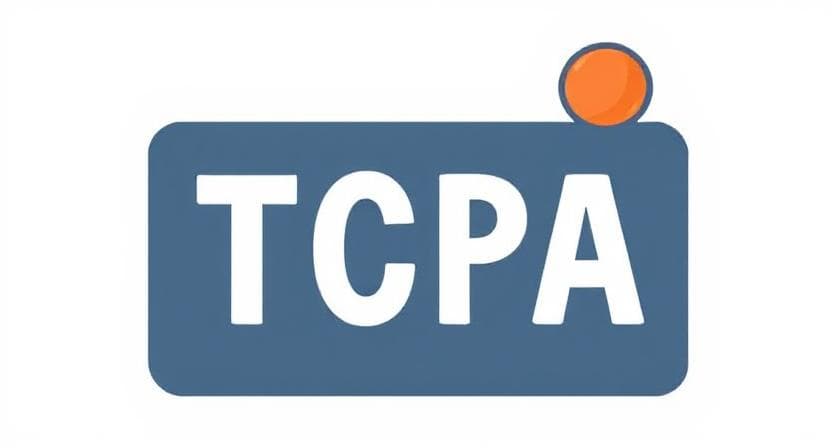Ever get a random call from a number you don’t know, only to hear a robot voice telling you about your car’s “extended warranty”? Or maybe your phone blows up with texts about deals you never signed up for. If you’ve ever thought, “Why do I keep getting these?”—well, you’re not alone. That’s where the TCPA comes in. The Telephone Consumer Protection Act (TCPA) is basically the law that tries to keep your phone from turning into a spam magnet.
| What’s Up? | Why It Matters |
|---|---|
| TCPA = Telephone Consumer Protection Act | Protects you from spam calls and texts |
| Covers robocalls, spam texts, faxes | Businesses can get fined for breaking rules |
| Consent is a big deal | You have rights to say “stop” |
| Real penalties for violators | You can report unwanted calls |

TCPA in Plain Language
Let’s break it down. The TCPA is like the bouncer at the club—if you’re not on the list, you’re not getting in. In this case, if a business doesn’t have your permission, they shouldn’t be blowing up your phone with calls or texts. The law’s been around since the early ‘90s, but it’s more relevant than ever now that everyone’s glued to their phone.
I remember when my grandma got a call saying she’d won a cruise. She was hyped, but it turned out to be a scam. The TCPA is supposed to help stop stuff like that, making sure people don’t get tricked or annoyed by unwanted calls.
TCPA Basics: The Law Without the Legalese
So, what does the TCPA actually do? Here’s the lowdown:
- Covers all kinds of calls and messages: Robocalls, spam texts, even faxes (yeah, people still use those).
- Applies to anyone doing business: Telemarketers, companies, even your dentist’s office if they’re sending out reminders.
- Consent is key: If you didn’t say “yes,” they shouldn’t be contacting you.
- Protects your peace: There are rules about when and how businesses can reach out.
What’s a Robocall Anyway?
A robocall is any call that plays a recorded message instead of a real person talking. You know the ones—“Congratulations! You’ve been selected…” Ugh.
Who Has to Follow the Rules?
- Telemarketers trying to sell you stuff
- Businesses sending promotions or reminders
- Pretty much anyone using an autodialer to hit you up
If you’re curious about how slang evolves around stuff like this, check out our guide on how new slang terms catch on.
How TCPA Impacts Everyday Life
Let’s get real. The TCPA isn’t just some boring law—it actually affects your day-to-day. Here’s how:
- Fewer annoying calls: If a company breaks the rules, you can report them. That means less spam for everyone.
- You control your phone: You have the right to say “stop” and companies have to listen.
- Know your rights: If you keep getting hit up by spam, you can take action (and sometimes even get paid if you sue).
What Counts as Breaking the Rules?
- Calling or texting you without your OK
- Ignoring your request to stop
- Using a robot voice or prerecorded message without permission
Expert Tip: If you get a spam call, don’t just hang up. Block the number, and add your info to the Do Not Call Registry. It actually works (most of the time).
Key Rules and Restrictions Under TCPA
Here’s where it gets interesting. The TCPA isn’t just about saying “no” to spam—it’s got some strict rules:
- Time limits: Businesses can’t call or text you before 8 a.m. or after 9 p.m. (your local time).
- Written consent for marketing: If a company wants to send you promos, they need your written permission.
- No autodialers for sales without consent: Those machines that blast out calls? Not allowed unless you said it’s cool.
- Special rules for certain numbers: Hospitals, emergency lines, and non-profits have extra protections.
Table: When Can They Contact You?
| Type of Message | Consent Needed? | Time Restrictions |
|---|---|---|
| Sales/Marketing | Yes (written) | 8am–9pm |
| Reminders/Info | Sometimes | 8am–9pm |
| Emergency | No | Any time |
If you’ve ever gotten a “scam likely” call, you know how annoying it is. That’s why knowing your rights matters. And if you want to decode the slang people use for these calls, check out our robocall slang breakdown.
Absolutely! Here’s the second half of the article on TCPA, crafted to be SEO-friendly, engaging, and easy to read, with all the markdown features and natural interlinks.
Types of TCPA Consent (And Why They Matter)
Consent isn’t just a “yes” or “no” thing—it’s got levels. Here’s how it breaks down:
- Written consent: This is the gold standard. If you’re getting marketing texts or calls, the company needs your signature (digital or old-school pen and paper) saying it’s cool.
- Verbal consent: Sometimes, just saying “sure, text me” is enough for informational messages, but not for sales pitches.
- Implied consent: If you give your number to a business, you might be agreeing to get certain messages, like appointment reminders.
Pro tip: If you’re not sure what you agreed to, check the fine print. Companies love hiding consent in the details. And if you want to know how “consent” gets tossed around in slang, check out this slang breakdown.
Types of Consent
| Consent Type | What It Covers | Example |
|---|---|---|
| Written | Marketing texts/calls | Signing up for promo alerts |
| Verbal | Info-only calls/texts | Saying “OK” to appointment text |
| Implied | Transactional messages | Giving your number at checkout |
The Cost of Breaking TCPA Rules
Messing with TCPA rules is risky. Companies that ignore the law can get hit with big fines—sometimes up to $1,500 per unwanted call or text. That adds up fast if they’re spamming thousands of people.
Here’s the wild part: regular people have sued telemarketers and won. There are stories of folks getting thousands of dollars just for keeping records of spam calls and taking companies to court. Not saying you should turn into a TCPA bounty hunter, but it’s good to know your rights.
Real-World Example
One guy in Texas kept getting robocalls about solar panels. He told them to stop, but they didn’t. He took them to court and walked away with a fat check. That’s TCPA in action.
TCPA Compliance Tips for Businesses
If you run a business, here’s how to avoid TCPA drama:
- Get clear consent: Always ask before sending marketing messages.
- Keep a “do not call” list: If someone says “stop,” add them to your list and don’t contact them again.
- Honor opt-outs fast: Don’t wait weeks—stop messaging as soon as someone asks.
- Train your team: Make sure everyone knows the rules, not just the boss.
- Use good tech: There’s software that helps track consent and manage lists.
Want to keep your business lingo fresh? Check out our text abbreviations for business guide.
TCPA and Slang: How People Talk About Spam Calls
Spam calls are so common, they’ve got their own slang. Here’s some you’ll see online:
- Robocall: Any call from a robot voice.
- Scam likely: What your phone says when it blocks a sketchy number.
- Call bombing: When someone gets hit with a ton of calls at once.
People love to roast spam callers on social media. Memes, TikToks, and even slang terms like “sus” (short for suspicious) get tossed around whenever someone gets a sketchy call. If you’re into slang, you’ll find more fun terms in our Gen Z slang guide.
Emoji in Spam Call Slang
- 🤖 = Robocall
- 📞 = Incoming call
- 🚫 = Blocked number
Memes and emojis make it easier to talk about these annoyances—and sometimes, laughing about it is the only way to deal.
Conclusion: Staying Informed and Protected
Knowing about the TCPA isn’t just for lawyers or business owners. It’s for anyone with a phone (so, basically everyone). You have the power to block, report, and even fight back if companies cross the line. Keep your number safe, don’t give out consent unless you mean it, and if you’re ever unsure, check out the latest slang meanings to stay in the loop.
If you’ve got a wild robocall story, or you’ve seen some hilarious spam call memes, share them with us! And if you want to decode more slang, head over to our slang homepage for the latest updates.
Spam calls might be annoying, but with a little knowledge and a lot of humor, you can keep your phone—and your sanity—protected.







